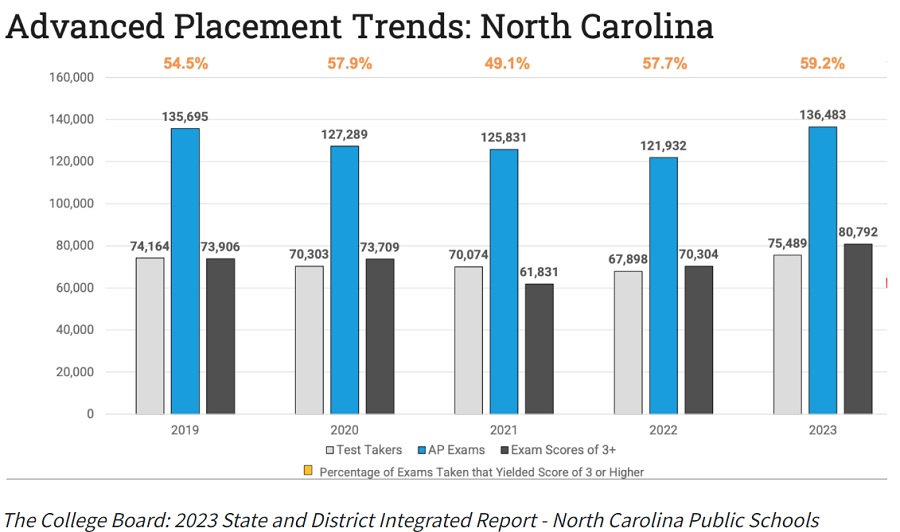
Special to Iredell Free News
RALEIGH — Rebounding from pandemic lows, North Carolina high school students in 2022-2023 participated and performed in college-level Advanced Placement courses at levels above those during the 2018-2019 school year, according to data reported by the College Board, which administers the AP program and exams.
The number of North Carolina students taking at least one AP exam last school year increased by 11.2% from the 2021-2022 school year, when AP participation in the state had fallen to its lowest level since the most recent pre-pandemic year of 2018-2019. By that same measure, North Carolina outpaced the nation as a whole, for which AP participation increased last year by 7.6% from the previous year.
Compared to 2018-2019 school year, the number of students taking at least one AP exam last year represented an increase of 1.8% — nearly five times the national increase of 0.37% since the same pre-pandemic year.
In terms of their performance on the exams, the number of North Carolina students with a proficient score of 3, 4 or 5 last year increased 12.6% from the 2021-2022 school year and 9.8% from 2018-2019. The nation as a whole saw an increase last year from the prior year of 9.2% and 4.2% from 2018-2019.
State Superintendent of Public Instruction Catherine Truitt said last year’s AP results are strong evidence that the state is not only recovering ground lost to the pandemic but also making significant advances.
“We could not be prouder of our students, families and teachers for their dedication and accomplishments,” Truitt said. “They have worked hard to ensure that students are prepared, engaged and successful in AP courses.”

In all last year, 75,489 students in the state’s public schools took a total of 136,483 AP exams, of which 80,792 received a proficient score of 3 or higher. That number of exams with a score of 3 or higher was 15.4% higher than 2021-22, and 9.3% higher than 2018-2019. By comparison, the nation’s one-year increase in proficient scores was 11.2% and 4.1% from 2018-2019.
With 59.2% of all exams taken by North Carolina students receiving a proficient score of 3 or higher, the state saw that rate at its highest level during the last five years. The proficient rate in 2018-2019 was 54.5%. Nationally last year, the proficiency rate on all AP exams taken was 60.2%.
Successful performance on Advanced Placement exams can help students earn transferrable college credit and save on college costs. In addition, research shows that students who take AP classes are more likely to persist in college and graduate in four years.
Sneha Shah-Coltrane, director of Advanced Learning and Gifted Education for the N.C. Department of Public Instruction, said the North Carolina’s improvement – both in terms of participation in AP courses and performance on the exams – reflect the state’s commitment to increased access and support for the courses.
“Not only are we broadening access to advanced level courses for students,” Shah-Coltrane said, “we are also supporting their success. We are making sure students have access to AP courses and also the high-quality education and supports they need to be successful. We will continue to work with our schools for equity and excellence – so that each student has the opportunity to be their best.”
The AP data from the College Board also show that North Carolina public school students continue to narrow racial and ethnic gaps regarding AP exam access:
♦ The number of AP exams taken by Black students increased by 14.7% over the prior year, outpacing the nation at 12.0% growth.
♦ The number of AP exams taken by Hispanic or Latino students increased by 20.6%, outpacing the nation at 13.3%.
In addition to increasing participation, North Carolina public school students also improved racial and ethnic gaps regarding success on AP exams:
♦ The number of AP exams taken by Black students earning a 3,4, or 5 increased by 21.8%, outpacing the national rate at 20.0%.
♦ The number of Hispanic or Latino students earning a score of 3,4, or 5 increased by 23.3%, outpacing the national rate at 16.2%.
The NC AP Partnership plays a critical role in supporting the growth of AP programming in schools, as well as the state coverage of AP exams. Professional learning and high-quality resources have paved the way for this success, Shah-Coltrane said.



